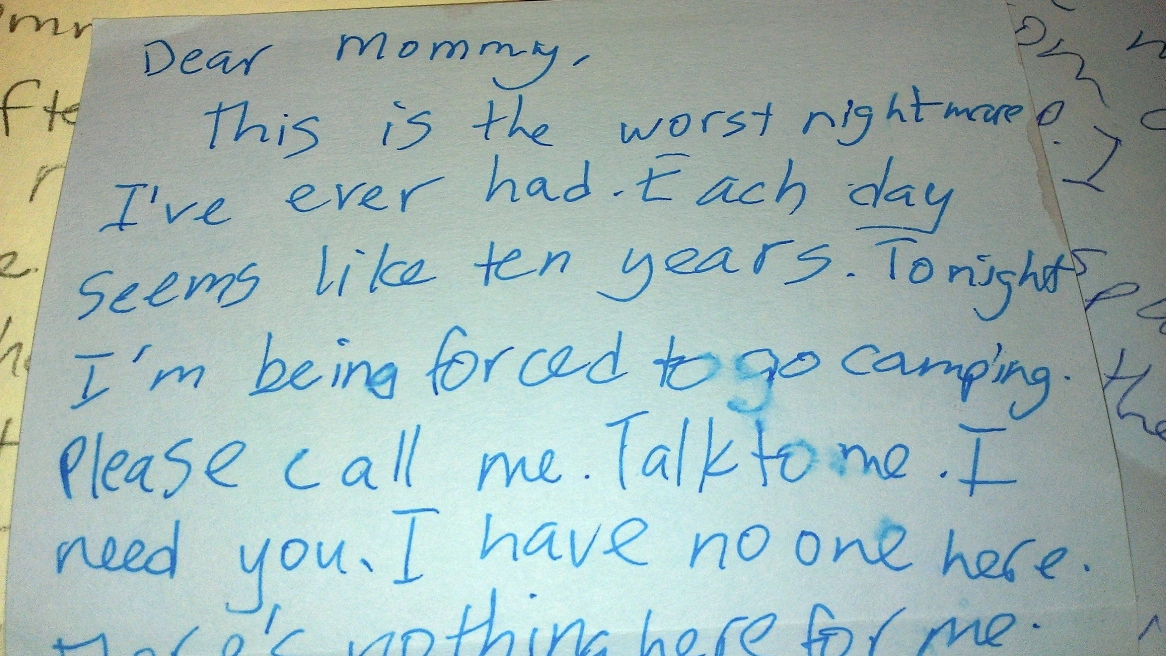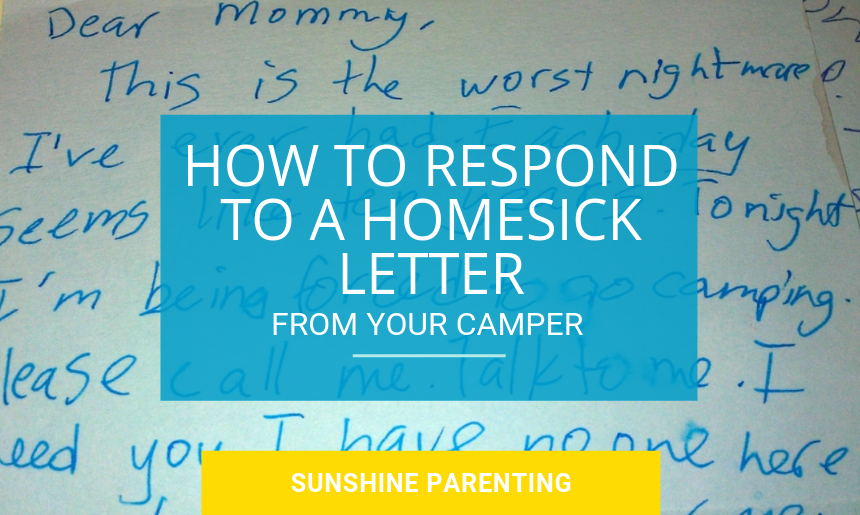The Sad Letter
You’re anticipating with much excitement your camper’s first letter from camp. It finally arrives, and this is what it says…
“I want to come home!”
“It’s awful here.”
“I hate everything.”
“This is worse than prison.”

From: https://thoughtcatalog.com/melanie-berliet/2013/08/10-desperate-letters-i-wrote-from-sleepaway-camp-and-the-separation-anxiety-i-still-cant-shake/
Your Options
Option #1: Hop in your car and drive to rescue your child immediately.
Option #2: Take a deep breath and think about possible next steps.
As a veteran camp director with a lot of experience helping campers (and parents) work through the difficult transition that often accompanies being away from home, especially the first time, I would highly recommend you choose option 2. It will be better for both you and your child.
Getting a sad letter from your kid is difficult, but, as experienced camp parents will tell you, you should expect to receive at least one sad letter during your camper’s time at camp. Letters are usually written during quiet times when campers are feeling more reflective. Often, even when they’ve written a super sad letter, the camper is actually adjusting well to camp and is letting you know the emotions they felt during a particularly down time (like rest hour or bedtime).
Next Steps
If you feel uneasy after hearing from your camper, here are a few steps you can take (after your deep breaths, of course):
- Remind yourself that homesickness is an emotion that most campers feel to some degree at camp and many college students experience, as well. Perhaps you can remember one of your own experiences being homesick – at camp, at college, or while studying abroad.
- Call a friend who is an experienced camp parent who has likely received one of these letters in the past.
- Know that in the vast majority of homesickness, the fun and excitement of camp eventually far outweigh any sad feelings.
- Contact the camp via phone or email and ask for an update on how your camper is doing. Let them know you got a sad letter and want to see how your child is adjusting. Remember, the letter could have been written and sent a few days ago, so the emotions expressed may not still be accurate.
- Write an encouraging letter to your camper. Acknowledge that you read their letter and tell your kid you want to be updated on everything, the sad moments but also the activities and new friends and adventures they’re having. Here are some ideas for positive, encouraging messages you can send to your camper.
Positive Messages for a Homesick Camper
Whether you’re communicating with your camper via postcards, letters, email, or phone, here are some ideas for how you can respond to their sad, homesick pleas from camp.
Validate Feelings
Your child might be genuinely feeling severe discomfort from being away from home. Acknowledge that by saying, “I know you feel miserable right now and I’m sorry this is so hard for you.” However, if they ask to be picked up early or talk to you on the phone, remind them that you’re going to stick with letter-writing only and that you’re not coming to get them early!
Provide Encouragement
Reassure them that you have confidence in their ability to face this challenge and have a great camp experience. Say, “Even though you don’t feel like you can do this, I know you can.” Let them know how proud you are of their independence and how excited you are to hear of their accomplishments when they finish camp.
Redirect
Redirect the conversation to something positive. Comment on a recent picture you saw of them online: I saw a picture of you jumping off your paddle board! It looked like so much fun! You can also help your child focus on the positive by reminding them of some of the positive things of camp that they don’t get to experience at home: “I can’t believe you get to have a campfire with marshmallows every night. Lucky duck!” Sometimes kids are concerned that they’re missing out on things happening at home or get worried about you missing them too much. Update them on some of the boring, busywork happening at home to assure them that camp is where they’re supposed to be. Asking questions about an activity they were particularly excited about or about their cabin mates and counselors can also be fun.
Remember the WHY of camp
As you deal with hearing about your child’s discomfort, it’s important to remind yourself and your camper why you chose the camp experience in the first place! Sometimes homesickness is part of the growth process, but we can instill confidence in our campers by encouraging them through uncomfortable and challenging situations rather than completely removing them from all sources of discomfort.
For many kids, camp is their first step toward independence. Leaving the familiarity of home for the first time, most kids experience some degree of discomfort or unease as they adjust to new people, activities, challenges, and experiences. These feelings of discomfort are completely normal, and it is important to discuss the normalcy of homesickness and feeling uncomfortable in new environments before your child leaves for camp.
In Homesick and Happy, Michael Thompson says that “Homesickness is not a psychiatric illness. It is not a disorder. It is the natural, inevitable consequence of leaving home. Every child is going to feel it, more or less, sooner or later. Every adult has had to face it and overcome it at some point in life … If you cannot master it, you cannot leave home.”
Real growth only comes when we’re stretched beyond our comfort zones, and that is why so many campers grow more confident during their time at camp: their comfort zone is stretched and they succeed in meeting the new challenges. Some kids end up adjusting and feeling comfortable quickly while others have a harder time adjusting. Either way, there are several ways you can both prepare and support your camper before and during their time at camp.
The biggest struggle for parents often is having to hear about the discomfort of their children as they navigate homesickness, but experienced camp leaders are well-equipped to encourage and come alongside both you and your child to make camp the most positive experience possible!
Related Posts & Podcast Episodes
Ep. 10: Homesick & Happy with Michael Thompson, Ph.D.
Ep. 39: How to Handle Your Camper’s Homesickness
“Kidsickness: Help for First-Time Camp Parents”
10 Messages for a Homesick Camper
Resources
10 Desperate Letter I Wrote From Sleepaway Camp
P.S. I Hate it Here (Book of letters from camp)
Homesick & Happy: How Time Away from Parents Can Help a Child Grow (book) by Michael Thompson, Ph.D.
Summer Camp Handbook (online edition), by Dr. Christopher Thurber
Some soothing advice for unhappy campers (seattletimes.nwsource.com)
Ready for Camp: Watch Bob Ditter Video | Camp Parents | American Camp Association

